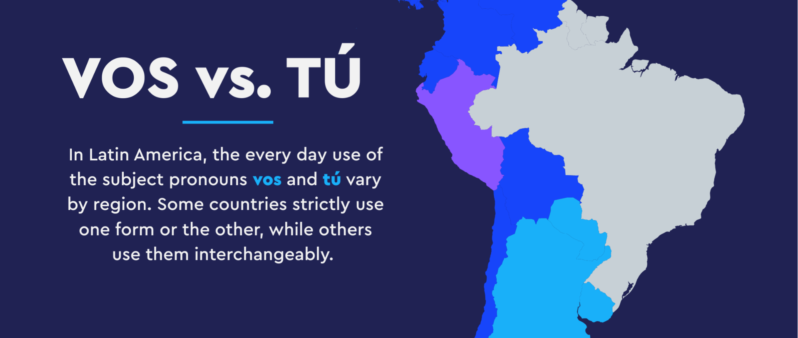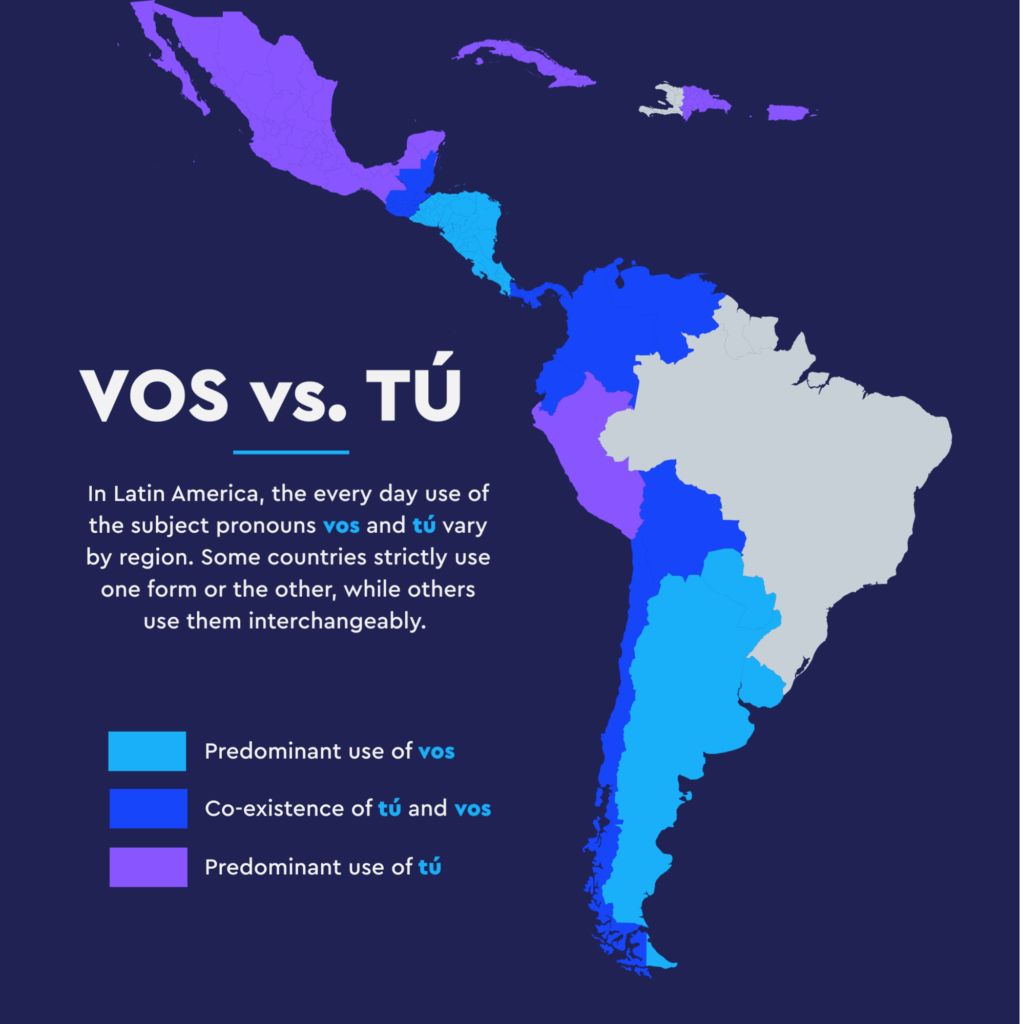
Tú vs Usted vs Vos: The Tricky Spanish Rules for “You”!
Spanish Learners Ask: What’s the Difference Between Tú, Usted, and Vos?
Learning Spanish subject pronouns is no easy feat, especially when we discover that there are three different versions of the second person singular: tú, usted, and vos.
That means there are three different ways to say “you” in Spanish, and infinite ways to find ourselves in embarrassing (or even offensive) situations when it comes to addressing people in Spanish.
Already feel lost? Don’t worry, we’ve broken down everything you need to get started navigating these pronouns.
- Definition of Spanish Subject Pronouns
- The Difference Between Tú, Usted, and Vos
- Where the Pronoun Vos Comes From
- Which Countries Use Vos vs. Tú
- How to Conjugate Vos in Spanish
- When to Stop Using Usted and Start Using Tú / Vos
Let’s start unpacking these pronouns!
What Are Subject Pronouns?
Subject pronouns are the words that indicate who or what is carrying out the action of a verb:
- yo (I)
- tú (you)
- vos (you)
- ella (she)
- él (he)
- ustedes (you plural)
- vosotros / vosotras (you plural)
- usted (you formal)
- nosotros / nosotras (we)
- ellos / ellas (they)
As you see, tú, vos, and usted are all different ways to address a person.
Tú, Usted, Vos – So What’s the Difference?
The easy answer is formality.
The general rule is that tú and vos are informal and usted is formal.
Tú and vos are generally used for addressing:
- Friends
- Family
- Peers
- Equals
- Children
- Pets (for all the animal lovers that find themselves talking to their pets)
Usted is the formal version of “you”, used when addressing:
- Elders
- Professionals
- Strangers (or people with whom you’re not familiar)
- Doctors
- Bosses
- Teachers
- Parents (rarely)
Wait a minute. Where does the pronoun vos come from, and why didn’t I see it in my Spanish textbook?
What is Vos in Spanish?

In the Americas, vos is an informal “you” like tú. It originated in the 1500s when the Spanish colonized Latin America and imposed a strict hierarchy of social classes. The indigenous people referred to members of the Spanish nobility as vuestra merced, meaning “your grace”. This term evolved to vuasted, later shortened to vos.
The usage of vos is also called the voseo or voseo americano.
More on Vos
Although it is almost non-existent today in Spain, vos can be found in literary works, dating as far back as the late 18th century.
Today, most teachers of either Castilian or Mexican Spanish don’t cover vos, seeing as it is irrelevant in their countries.
On the other hand, in some countries such as Argentina and Uruguay, vos actually replaces both tú AND usted to form a singular formal / informal pronoun. Here, knowing how to use vos is super relevant for your survival in academia, marketing, and even politics.
And then some places use both. In parts of Central America, like El Salvador, vos might dominate informally but usted is still used in a formal context.
Which Spanish-Speaking Countries Use Vos?

Some say that countries that predominantly use vos were geographically isolated during colonial times, whereas countries that hardly use it – Mexico, Cuba, Peru, and the DR – had better communications with Spain during colonization.
Every region has its own peculiarities and ways to employ pronouns, but generally, the breakdown of voseo by country is the following:
| Countries where vos is predominant: | Countries where both vos and tú are used: | Countries where tú is primarily used. |
| Argentina, Uruguay, Paraguay, El Salvador, Guatemala, Honduras, Nicaragua, Costa Rica | Bolivia, Colombia, Ecuador, Panama, Venezuela, Chile | Spain, Dominican Republic, Puerto Rico, Mexico, Peru, Cuba |
How to Conjugate Vos
Here is how to conjugate vos in Spanish, compared to tú:
| Verb | Vos (Present Indicative) | Vos (Imperative) | Tú (Present Indicative) | Tú (Imperative) |
| Tener | Tenés | Tené | Tienes | Ten |
| Sentir | Sentís | Sentí | Sientes | Siente |
| Decir | Decís | Decí | Dices | Di |
| Comer | Comés | Comé | Comes | Come |
| Andar | Andás | Andá | Andas | Anda |
| Ser | Sos | Sé | Eres | Sé |
**Regional varieties might conjugate differently, i.e. Chile & Maracaibo. See regional differences below.
Regional Differences in Vos
There are endless regional discrepancies when it comes to voseo in the Americas. In the Zulia region of Venezuela and in Panama’s Azuero Peninsula, vos is conjugated as vosotros.
In Chile, on the other hand, among friends you’ll hear tú used with the vos conjugation, but the vos conjugation here is even more irregular than the one listed above. Here are some examples:
- Ser – tú soi or tú erís
- Estar – tú estai
- Ir – tú vai
- Haber – tú hai
Some theories say that this conjugation derives from vosotros, but because Chileans hardly ever pronounce the letter “s” at the end of a word, it went from sois → soi and estais → estai. Although Chileans don’t use the voseo for the imperative tense, they do use it in the past imperfect and future tenses.
We can’t list every regional difference in this article, so leave some of the ones you’ve encountered in the comments below!
When Do You Stop Using Usted and Start Using Tú / Vos?
This is a gentle process that has to be approached with ample emotional intelligence.
There are some older people who would be extremely offended if a young person addressed them informally, and others who would be offended by the opposite.
The best way is to listen to how others are addressing the person. This is especially important in work environments.
When you’re unsure, always use usted. It’s your safest bet, followed by tú and lastly by vos.
If you want to ask someone if they would prefer to use tú, the verb is tutear.
For example:
¿Nos podemos tutear?
“Can we call each other tú?”
¿Te puedo tutear?
“Can I use tú with you?”
And if someone screams Tutéame!, for example your boyfriend/girlfriend’s parents, then they want you to call them by their informal pronoun.
Now That We Know Each Other… ¡Tutéanos!
Once you get to know someone, you’ll most likely use tú with them.
Know of any other regional differences in pronouns? Tell us in the comments!
For additional Spanish practice, download our App for Pimsleur Castilian Spanish or Pimsleur Latin American Spanish and learn Spanish in context.

5 Comments for "Tú vs Usted vs Vos: The Tricky Spanish Rules for “You”!"
Hey all!
Here’s my take on when to use Tu vs Estar – I hope you like it! (I made audios too!)
https://spanishtutoring.com/tu-vs-usted/
Emilio
http://www.SpanishTutoring.com
This article is COMPLETELY counter factual. VOS can from Latin, and vuestra merced > vuasted > usted. Please correct this information using more reliably sources.
Mi lengua materna es el español y encontré varios errores en este artículo. Sería bueno que lo pudieran revisar nuevamente y corregirlos.
Actually vos came to Spanish via Latin and the term was always used as a formal way to address people because usted did not exist in medieval Spanish. Usted later developed from vuestra merced being shortened and usted later became the formal pronoun and tú and vos both became used as the informal pronouns. However in medieval and Spanish used before the 18th century vos (even for some today when it is conjugated like vosotros) is used as a formal way to address someone instead of usted.